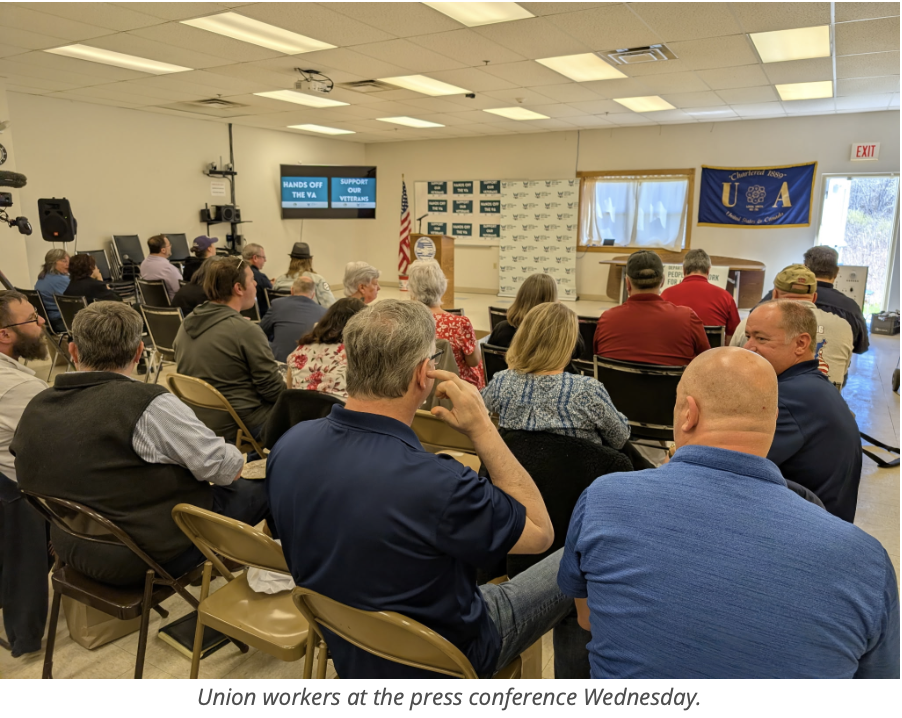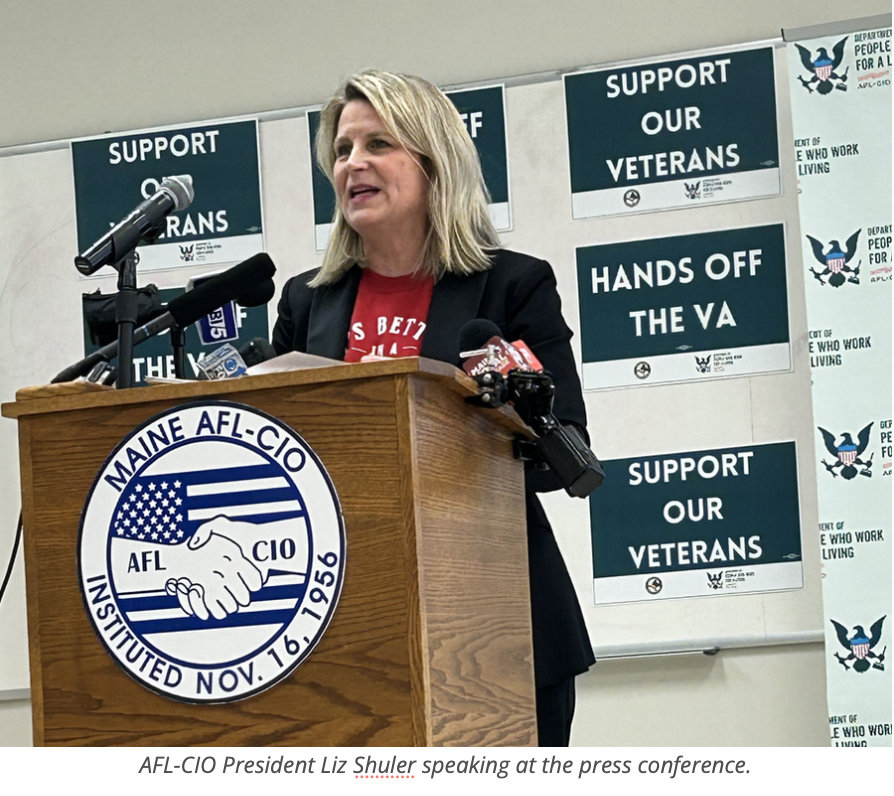Maine Veterans & VA Workers Oppose VA Cuts That Will Harm Veterans and Delay Veterans Services and Benefits

PHOTO: VA employee Elizabeth Harkins, Tri-State President of AFGE 2604 speaks at a press conference Wednesday against cuts to the Veteran's Administration.
Maine Veterans, VA employees and other union workers spoke out on Wednesday against cuts to the Veterans Administration that will result in harm to veterans and delays in veterans’ services and benefits. They also spoke about proposed DOGE cuts to the federal workforce which, if enacted, would result in the largest layoff of veterans in US history. They were joined by national AFL-CIO President Liz Shuler for a roundtable discussion about the impact of these cuts on veterans and our communities as part of theDepartment of People Who Work for a Living’s field hearings across the country.
VA workers highlighted the dire consequences for veterans if the Administration moves forward with its plan to lay off more than 83,000 VA employees this year.
“The proposed reduction in workforce, a rollback to pre-2020 staffing levels would have devastating consequences,” said VA employee Elizabeth Harkins, the Tri-State President of AFGE Local 2604, representing more than 1,600 employees across Maine, New Hampshire, Vermont, and Western Massachusetts and servicing many veterans from Southern Maine. “It would further delay healthcare services. It would delay the processing of vital disability compensation and pension claims. And the reality is undeniable: We are already serving an ever-growing population of veterans with constrained resources.”
Harkins noted that the demand for VA services surged dramatically following passage of the Honoring Our Promise to Address Comprehensive Toxics Act, the PACT Act, which expands VA health care and benefits for veterans exposed to burn pits, Agent Orange, and other toxic substances. The VA hired tens of thousands of new employees across both Veterans Health Administration and Veterans Benefits Administration to keep up with the surge in applications.

"Veterans who receive care at VA Togus praise staff about the wonderful care provided,” said Togus VA Medical Center employee Daniel Gutierrez, the Secretary Treasury of AFGE 2610, the union representing workers at Togus. “Cutting jobs affects how we provide that care. Veterans Affairs need to keep all our staff to continue that level of success.”
Pending VA disability claims have surged from 353,072 in 2019 to 935,732 as of March 1, 2025, while pending disability claims have soared from 353,072 in 2019 to 935,732 as of March 1, 2025. At the same time backlogged claims — those pending for more than 125 days — have nearly tripled. Currently, the VA serves more than 9.1 million Veterans — with an additional 2.8 million receiving care in the community, where longer wait times continue to grow. In the past year alone, VA healthcare enrolled over 401,000 Veterans — an increase of 30 percent compared to the previous year. Veterans are using the VA much more. It is clear that the VA needs more staff not drastic staffing cuts.
Nearly 1 in 3 federal employees (28 percent) is a veteran, compared to 5 percent in the private sector, thanks to policies that recognize the skills veterans bring to the workplace and give preference in hiring to veterans in the federal sector.
“Roughly one in three federal workers is a veteran. When we gut the federal workforce we are gutting veterans,” said Scott Surette, US Marine Corps veteran and Branch 122 President of Mailhandlers Local 301. “If implemented, this Administration’s stated goals for the federal workforce would result in the largest layoff of veterans in United States history. That is a promise broken to our veterans and it is wrong.

According to the Metal Trades Council, a union council representing 3,650 members at Portsmouth Naval Shipyard, hundreds of employees — including veterans who had already accepted job offers and, in some cases, moved across the country — now sit in limbo. The Trump administration has also eliminated veterans’ resource groups at the shipyard under its anti-DEI executive order.
“When people hear the term “DEI initiatives” — which were among the first targets of this administration’s executive orders — they may think about attacks on ethnic minorities, the LGBTQ+ community, and women,” said Metal Trades President Alana Schaffer. “But what often gets missed — is that veterans are being hurt by these rollbacks too. Under the guise of eliminating DEI, we were told to dismantle all employee resource groups — including our Veterans’ Resource Group. That space wasn’t political. It was vital. It offered camaraderie. It helped veterans understand their benefits. It helped them access the support they earned — support that can be confusing, complicated, and overwhelming to navigate alone. And now it’s gone.”
“In my time at the Postal Service, I have seen hundreds of veterans come into good union jobs. The Postal Service employs nearly 100,000 veterans,”said US Army veteran Scott Adams, President of the American Postal Workers Union Local 458.“The Postal Service and the federal civil service are a critical component of supporting veterans in the transition back into civilian life. These good jobs are a key part of honoring our promise to veterans to take care of them when they come back home. So when you attack these good quality jobs – through privatization or stripping of collective bargaining rights or dismantling federal agencies or illegal mass firings of federal workers – you are by definition harming veterans and the system we’ve built to support veterans coming back into civilian life with the security of a solid, union job.”
Workers at Portsmouth Naval Shipyard spoke about the harmful impact the Trump administration’s executive order stripping 1 million federal employees of their collective bargaining rights has had on veteran workers. The Trump administration has also eliminated veterans resources groups at workplaces, including Portsmouth Naval Shipyard, harming the ability for veterans to connect to services they need as a result of implementation of the President’s DEI Executive Order.
“As a U.S. Army veteran with over 21 years of honorable service and a federal civilian employee since December 2016, I have firsthand experience with both the dedication of our nation's veterans and the systemic challenges we face,” said George Hart, a disabled US Army veteran who did two tours in Iraq and one in Afghanistan, and member of International Federation of Professional and Technical Engineers (IFPTE) Local 4 at PNSY. “Recent actions, such as the Department of Defense’s Defense Review Process (DRP) realignment and the cutbacks to Department of Veterans Affairs (VA) staffing, are compounding challenges. These decisions are actively eroding the critical services veterans rely on. Reducing resources for veterans while simultaneously increasing bureaucratic barriers leaves many without the timely, quality assistance we have earned through our service.”
These harmful actions to veterans will disproportionately impact Maine as a state with a high percentage of veterans. Maine is home to 106,000 veterans, representing 10 percent of the State’s adult population, well above the national average.
